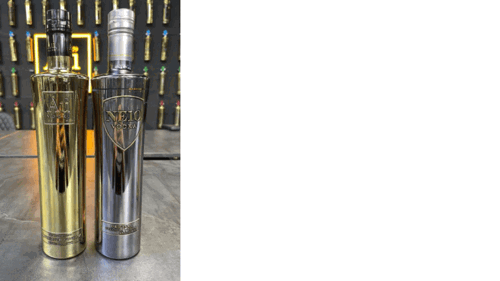A recent High Court judgment has demonstrated how hard it is to succeed in a claim for passing-off against a competitor who copies your product packaging. Registering and then enforcing trade marks and designs is, instead, often the better option.
In the case of Au Vodka Ltd -v- (1) NE10 Vodka Limited and (2) Leon Hogan [2022] EQHC 2371 (Ch) the claimant failed to convince the judge that an interim injunction was appropriate to prevent the defendants from selling vodka in lookalike packaging.
Au is a vodka brand, selling a range of vodkas in gold metallic bottles. Au launched in Swansea, Wales in 2015. In 2021/22 its revenue was over £43m.
NE10 launched its own vodka brand in 22 August 2022. The vodka is sold in bottles that are also metallic.
A comparison of the bottle designs for the different rival brands of plain vodka is shown below:

Au issued proceedings against NE10 for passing-off, based on the allegedly deceptively similar get-up of the defendants’ vodka to the get-up used by the claimant. It also issued an application seeking an interim injunction to restrain NE10’s sales and marketing of its vodka products until trial.
When deciding whether an interim injunction should be granted, the judge considered the well-established American Cyanamid criteria:
When commenting on whether there was a serious issue to be tried, the judge referenced the famous Jif Lemon case (Reckitt & Coleman Ltd v Borden Inc [1990] 1 All E.R. 873) as being one of the very rare ‘get-up’ cases that succeeded. The judge pointed to the fact that, in the Jif Lemon case, the crucial point of reference for a consumer who wanted to purchase a Jif squeezy lemon was the lemon shaped packaging itself, rather than the brand name JIF. The evidence in that case showed that consumers did not read the label, whereas in the current case the judge found that “the word/graphic elements on the respective bottles are Au79 and NE10. Unlike in the Jif Lemon case, this labelling cannot be discarded. The evidence suggests that the claimant’s labelling is noticed, because consumers refer to it as ‘Au vodka’. This evidence also provides strong support for the proposition that the (larger) NE10 labelling does not go unnoticed by consumers, and indeed that the defendants’ products will be referred to as NE10 vodka.”
The judge declined to grant Au an interim injunction.
Primarily, it seems this was because, whilst he thought consumers would notice the similarity in the parties’ bottles, those were likely to be outweighed by the different name ‘NE10’, as opposed to ‘Au’, and the fact that none of the defendants’ bottles are gold coloured. Thus, there was unlikely to be any misrepresentation made and therefore no ‘passing-off’ would arise.
It is very difficult to succeed in a claim for passing-off where the claim relates solely to the alleged similarities between the packaging (rather than the names) of two rival products.
A better strategy is for brand owners to look to register the visual appearance of the packaging of their goods as registered trade marks and registered designs. Both can often provide a stronger base for a claim for infringement.
In particular, pursuant to s.10(3) of the Trade Mark Act 1994, a person can infringe a registered trade mark if they use, in the course of trade, in relation to goods or services, a sign which is identical with or similar to a registered trade mark, where the trade mark has a reputation in the United Kingdom and the use of the sign, being without due cause, takes unfair advantage of, or is detrimental to, the distinctive character or the repute of the trade mark.
If Au had registered the packaging of their product as a registered trade mark, they could have argued, pursuant to s.10(3), that NE10 were ‘free-riding’ off the reputation of their registered trade mark, by choosing to sell their vodka in similar looking bottles. No misrepresentation or likelihood of confusion is necessary to succeed with a s.10(3) infringement claim.
For more information please contact Chris Fotheringham.
We produce a range of insights and publications to help keep our clients up-to-date with legal and sector developments.
Sign up